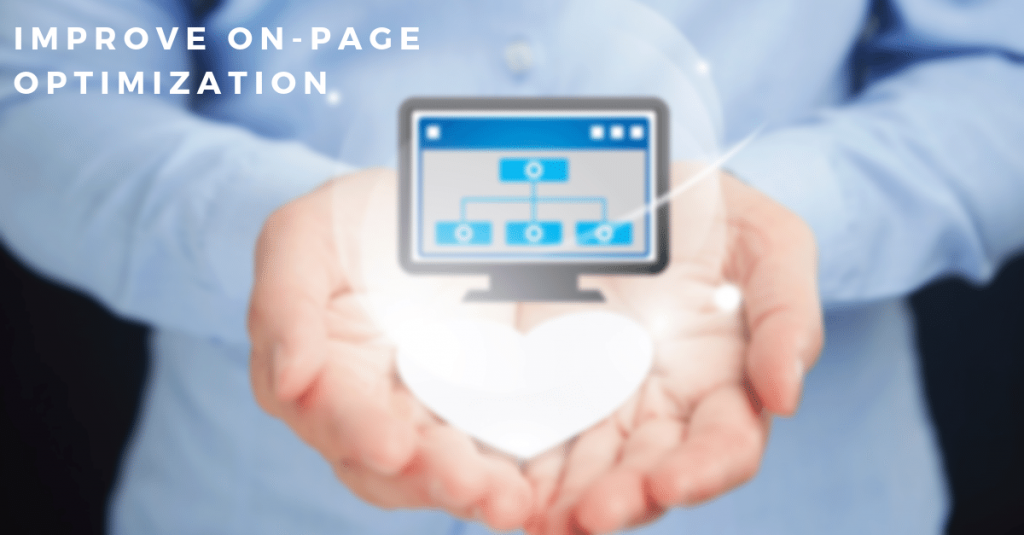
On-Page Optimization
Utilizing On-Page Optimization on your website is an easy way to boost your SEO score. Read what we believe are the Top 5 Easiest ways to do this.
Targeted Keywords
Organic Keyword Research
Researching organic keywords is a great way to boost your search engine optimization (SEO) conquest. One of the easiest ways to search for good keywords is to simply search on Google. This will validate that the keywords you are using are searched for on the internet.
Doing a Google search will also help you find long-tail keywords. Long-tail keywords are 3 to 5 words that make up a phrase specific to the content of the webpage.
After you have formed a list of keywords you want to use, rank them in an order of priorit. You should prioritize them by how difficult they will be to reach top organic results.
Strategic Keyword Placement
It is essential to place your main keyword phrase in the titles of the page.
Imagine a nail salon has a “Services” page on their website. Under their services will probably be “Gel Manicures”. The heading should include “Gel Manicures” and the first sentence of the paragraph detailing the service should include “Gel Manicure”.
For a smaller size of content, you don’t want to use your main keyword more than 2 – 3 times. Keyword Stuffing will cause penalties by the Google and will then make you appear lower on the SERPs.
For a larger type of content, such as a blog, using the keyword up to 11 times is optimal. Again, if you overuse targeted keywords, Google will penalize you and will put you lower on the SERPs.
Meta Title Tags and Meta Descriptions
Title and Meta Tags are essential to use and easy to forget. The use of title and meta tags does not alter any of the content that is on the webpages. However, it is necessary for search engines.
Title Tag Purposes
Imagine you search “Minnesota Twins” on Google. Think of all the results that appear. The “Title Tag” is the clickable part of what shows up in search engine results.
You should associate a Title Meta Tag with each page so search engines can identify the content within the page. You may utilize multiple Title Tags within your page. The most important keywords or keyword phrases help to identify to search engine bots the intent of your content.
Having an interesting and engaging Title Tag for your page will also help to draw consumers into your site.
Meta Description
Remember how we talked earlier about how the Meta Tag is the clickable part of the search result? As you can probably infer, the meta description describes what the content of the page is about. It is important to use your main keyword or keyword phrase within the meta description as well. This is simply another way for search engine bots to recognize what keyword(s) you are utilizing.
Internal Linking
In case you haven’t noticed, we have linked previous blogs from our website to this particular blog. If you have read previous Pulse Digital Advertising blogs, you have seen how we have linked to our services webpage or to receive a free consultation.
This is internal linking. Or, in defined terms, linking one webpage on your website to another webpage on your website. This is important to help consumers keep further engaged in your content and explore other parts of your website.
Having internal linking that works is essential to the crawlability of your entire website. Check out the internal linking that we just utilized to find out more about crawlability!
The ultimate goal is to have other pages link to your webpages. This is further proof to Google’s search bots that the information you are putting out there is credible. As a result, it usually receives a higher search engine ranking.
Updated Website Content
Let’s say 4 years ago, your company spent a lot of money with a web developer for updated website content and revamped SEO. And since then, a blog every two to three weeks has been posted to the site. However, essentially all other parts of the website have stayed the same.
While the content that is on there is probably good, the world of digital marketing changes every 4 to 5 seconds (not even slightly joking). That being said, it is important to ensure that all necessary parts of the webpage are updated regularly. Links can be broken and information can quickly become outdated. The simple act of adding more content to a website will boost your SERP. Industry standards state its optimal to update your website roughly once a week.
Adding relevant content continuously is also essential for keeping your customers engaged.
URL Slug
The URL Slug is anything that comes after the name of your webpage. For example, take a look at:
https://www.pulsedigitaladvertising.com/blogs-pulse-digital-advertising/
In this instance, /blogs-pulse-digital-advertising is considered the URL Slug. You want this to describe the page using a keyword or phrase that people will search for. You also want it to be as short as possible.
Recap
Utilizing On-Page Optimization is necessary for the SEO health of your website. We hope that you now have a better understanding of easy ways to do so.